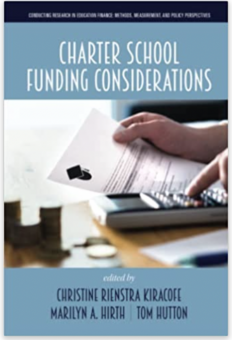Charter School Funding Considerations examines charter schools through the lens of professionals and researchers in the field, providing readers with an overview of operational and funding issues related to these institutions. The Center for Learner Equity co-founders Paul O’Neill and Lauren Morando Rhim have written chapters in the text, demonstrating their expertise in the field. O’Neill authored the opening chapter entitled “Understanding Charter Schools”, providing readers with an overview of charter schools and how they are funded. Rhim builds upon O’Neill’s work via a thorough examination of funding equity and the financial management of charter schools in the chapter titled “Funding Special Education in Charter Schools”.
The chapters written by CLE’s co-founders are key contributions to Charter School Funding Considerations as they provide a foundation for the conversation of special education in charter schools, imparting readers with an awareness of how the funding for charter schools operate. Rhim and O’Neill wrote these chapters with the intention that their research will help inform policy and practice related to securing and allocating funds to support students with disabilities.
Charter School Funding Considerations conveys an extensive amount of information regarding the operation and funding of charter schools. The key takeaways from “Understanding Charter Schools” and “Funding Special Education in Charter Schools” are:
- A funding system that provides local schools with adequate and equitable funding as outlined in IDEA has yet to be identified
- An estimated 334,000 students with disabilities—who are entitled by law to a free appropriate public education (FAPE)—attend charter schools
- Funding allocations for special education vary nationally, with state and local contributions typically representing 85% of total dollars
- Securing adequate funding for special education and related services is challenging, particularly for autonomous charter schools
- Often times it is unclear to stakeholders the sources schools and districts utilize to fund special education and related services
- Interpreting the circulation of special education funding requires an understanding of how multiple federal, state, and local policies interact, and how policymakers have modified established policies and practices to include charter schools in state laws
 Charter School Funding Considerations is available on Amazon.
Charter School Funding Considerations is available on Amazon.
Comments are closed.